
Liza of Lambeth (1897) was W. Somerset Maugham's first novel, which he wrote while he was a medical student and obstetric clerk at St Thomas's Hospital in Lambeth, then a working-class district of London. It depicts the short life and death of Liza Kemp, an 18-year-old factory worker who lives with her aging mother in the fictional Vere Street off Westminster Bridge Road (real) in Lambeth.

David Cecil MacAlister Tomlinson was an English stage, film, and television actor and comedian. Having been described as both a leading man and a character actor, he is primarily remembered for his roles as authority figure George Banks in Mary Poppins, fraudulent magician Professor Emelius Browne in Bedknobs and Broomsticks, and as hapless antagonist Peter Thorndyke in The Love Bug. Tomlinson was posthumously inducted as a Disney Legend in 2002.

Upstairs, Downstairs is a British television drama series produced by London Weekend Television (LWT) for ITV. It ran for 68 episodes divided into five series on ITV from 1971 to 1975.
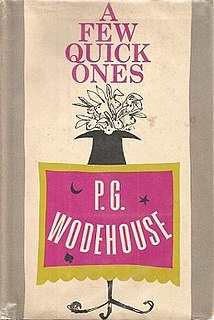
A Few Quick Ones is a collection of ten short stories by P. G. Wodehouse. It was first published in the United States on 13 April 1959 by Simon & Schuster, New York, and in the United Kingdom on 26 June 1959 by Herbert Jenkins, London. The first US edition dust jacket was designed by Paul Bacon. The book's title comes from the informal phrase "a quick one", which is British slang for an alcoholic drink consumed quickly.

The Constant Wife, a play written in 1926 by W. Somerset Maugham, is a comedy whose modern and amusing take on marriage and infidelity gives a quick-witted, alternative view on how to deal with an extramarital affair.

Pygmalion is a 1938 British film based on the 1913 George Bernard Shaw play of the same name, and adapted by him for the screen. It stars Leslie Howard as Professor Henry Higgins and Wendy Hiller as Eliza Doolittle.
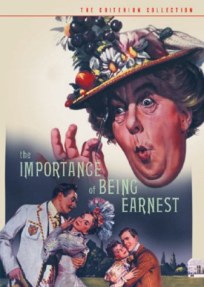
The Importance of Being Earnest is a 1952 British comedy-drama film adaptation of the 1895 play by Oscar Wilde. It was directed by Anthony Asquith, who also adapted the screenplay, and was produced by Anthony Asquith, Teddy Baird, and Earl St. John.
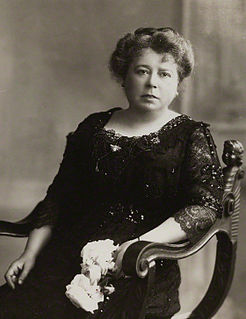
Mary Bessie Brough was an English actress in theatre, silent films and early talkies, including eleven of the twelve Aldwych farces of the 1920s and early 1930s.
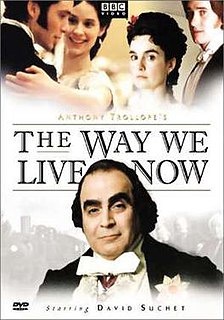
The Way We Live Now is a 2001 four-part television adaptation of the Anthony Trollope 1875 novel The Way We Live Now. The serial was first broadcast on the BBC and was directed by David Yates, written by Andrew Davies and produced by Nigel Stafford-Clark. David Suchet starred as Augustus Melmotte, with Shirley Henderson as his daughter Marie, Matthew Macfadyen as Sir Felix Carbury, Cillian Murphy as Paul Montague and Miranda Otto as Mrs Hurtle.

The Manhattan Theatre was located at 102 West 33rd Street in Midtown Manhattan, New York City, directly across from Greeley Square at Sixth Avenue and 33rd Street. The 1,100-seat theatre opened in 1875 as the Eagle Theatre, and was renamed the Standard Theatre in 1878. All but destroyed by a fire in 1883, it was rebuilt in a more modern style and re-opened in December 1884. In 1898, the Standard was refurbished by architect Howard Constable and renamed the Manhattan Theatre. The theatre was demolished in 1909 for the construction of a flagship Gimbels department store, now the Manhattan Mall.

Celestina is an eighteenth-century English novel and poet Charlotte Smith’s third novel. Published in 1791 by Thomas Cadell, the novel tells the story of an adopted orphan who discovers the secret of her parentage and marries the man she loves. It is a courtship novel that follows the typical Cinderella plot while still commenting on contemporary political issues.
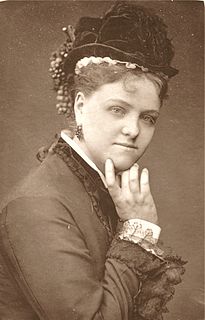
Kate Alice Bishop was an English actress from Bristol, a member of a theatrical family. Her brother and daughter were also successful actors. Her greatest success was in Our Boys, which ran for more than four years in London. She temporarily retired from the theatre in the late nineteenth century, and returned to play character roles in the early years of the twentieth century.
"I Dies from Love" was the eighth episode of the first series of the British television series, Upstairs, Downstairs. The episode is set in the summer of 1907.

Lottie Venne was a British comedian, actress and singer of the Victorian and Edwardian eras, who enjoyed a theatre career spanning five decades. Venne began her stage career in musical burlesque before moving into farce and comedy. She appeared in several works by each of F. C. Burnand and W. S. Gilbert and was often in plays with Charles Hawtrey later in her career.

Lydia Bilbrook was an English actress whose career spanned four decades, first as a stage performer in the West End, and later in films.
Smith is a 1917 British silent romance film directed by Maurice Elvey and starring Elisabeth Risdon, Fred Groves and Manora Thew. It was based on the 1909 play Smith by Somerset Maugham.
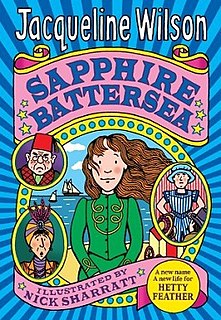
Sapphire Battersea is the 2011 sequel to Hetty Feather, written by English author Jacqueline Wilson. It is the second installment in the Hetty Feather Trilogy. The story continues where Hetty Feather left off. Hetty, now 14 years old, is discharged from the Foundling Hospital and begins life as a scullery maid.

Lady Frederick is a comedy by the British writer W. Somerset Maugham, written early in his career. The play was first seen in London in 1907, and was very successful, running for 422 performances. The title role was played by Ethel Irving. In New York it was first performed in 1908, with Lady Frederick played by Ethel Barrymore, who reprised her role in the play's film adaptation, The Divorcee.

The Sisters who Envied Their Cadette is a fairy tale collected by French orientalist Antoine Galland and published in his translation of The Arabian Nights, a compilation of Arabic and Persian fairy tales.


















